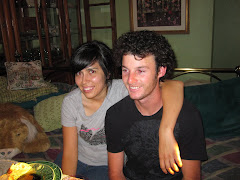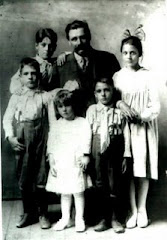Please read: John 19:1-42
Jesus has been betrayed, denied, brought before the Sanhedrin court, than brought to Pilate, who sent him to Herod, who in turn sent him back to Pilate. Jesus has endured much.
(John 18:1-40; Luke 22:66-23:16)
Pilate has Jesus scourged and the soldiers heap more abuse on him by braiding a crown of thorns and pushing it down on his head. They clothe Jesus in a purple robe and mockingly say: "Good day, you King of the Jews!" They continue in their abuse, spitting on Jesus and slapping him in the face. Jesus example in the face of this persecution is something for us to meditate on.
-verses 1-3
Jesus' remarkable dignity and strength in the face of this mistreatment impresses Pilate, who is moved to make another attempt to release him. Pilate again proclaims that he finds no fault in Jesus. With respect and pity, Pilate says to the crowd: "Look! The Man!" Though bruised and battered, here stands the most outstanding figure of all history, truly the greatest man who ever lived! Jesus' quiet dignity and calm shows a greatness that even Pilate must acknowledge. However, the chief priests and the officers react by shouting: "Impale him, Impale him!"
-verses 4-7

The Jews see that their political charges have failed, they now tell Pilate that Jesus made himself God's son, for that he ought to die. This charge is new to Pilate, causing him to be fearful, so he questions Jesus further. Jesus remains silent, but this hurts Pilate's pride and he flares up at Jesus saying: "Do you not know I have authority to release you and I have authority to impale you?"
"You would have no authority at all against me unless it had been granted to you from above," is Jesus respectful answer. He is referring to the authority of human rulers to administer earthly affairs that God allows or grants.- verses 8-11.
Impressed even more with Jesus and fearful that he may have divine origin, Pilate tries again to release him. The Jews repeat their political charge, threatening: "If you release this man, you are not a freind of Caesar. Every man making himself a king speaks against Caesar." Pilate asks in desperation, "Shall I impale your king?" Yet, these Jews, including the chief priests, who hate living under Rome's domination hypocritically say: "We have no king but Caesar." Fearing for his political position and reputation, Pilate finally caves in and hands Jesus over. - verses 12-16
Jesus is taken, along with two criminals to Gol'go-tha (Skull Place) where he is hung on a stake. Pilate has posted a sign, written in three languages: Hebrew, Latin, and Greek. The chief priests, including Caiaphas and Annas protest: "Do not write 'The King of the Jews,' but that he said, 'I am King of the Jews.'" Pilate answers with contempt: "What I have written I have written."- verses 17-22
The soldiers unwittingly fulfill prophecy when they divide his garments in four parts and cast lots over his inner garment. (Psalms 22:18) -verses 23,24

Jesus' mother and her sister Salome, Mary Magdalene, and Mary the mother of the apostle James the Less, make their way close to the torture stake. John, Jesus' beloved apostle, is with them there. Jesus' thinks not of his own pain, but of his mothers welfare. With great effort, he nods toward John and says to his mother: "Woman, see! Your son!" Then nodding toward Mary, he says to John: "See! Your mother!" Jesus entrusts the care of his mother, who is evidently a widow, to his specially loved apostle. (Mary's other sons have not yet put faith in Jesus.) Jesus sets a fine example in making provision not only for his mother's physical needs but also for her spiritual ones. -verses 25-27.

Jesus receives the sour wine, then cries out: "It has been accomplished!" Yes, he has finished everything that his Father has sent him to do. Finally, he says: "Father, into your hands I entrust my spirit." Then he bows his head and dies. It is getting late in the day, and the Sabbath of Nisan 15 will begin at sundown. Jesus' dead body hangs limp on the stake, but the two robbers alongside him are still alive. According to God's Law, bodies are not to be left hanging on a stake overnight. So the Jews ask Pilate that the death of those being executed be hastened by breaking their legs. Since Jesus appears to be dead, his legs are not broken. This fulfills the scripture: "Not a bone of his will be crushed." (Ps. 34:20) However, to remove any doubt that Jesus is really dead, one of the soldiers jabs a spear into his side. The spear pierces the region of his heart, and immediately blood and water come out. This fulfills the scripture: "They will look to the One whom they pierced." (Zechariah 12:10) -verses 28-37
Joseph of Arimathea, although afraid to identify himself as a disciple of Jesus, now exercises courage and goes to Pilate to ask for Jesus' body. Then assisted by Nicodemus takes the body and wraps it in clean fine linen, along with aloe and spices. The body is then laid in a tomb that is carved in the rock in the garden nearby. Finally, a large stone is rolled in front of the tomb.
(John 18:1-40; Luke 22:66-23:16)
Pilate has Jesus scourged and the soldiers heap more abuse on him by braiding a crown of thorns and pushing it down on his head. They clothe Jesus in a purple robe and mockingly say: "Good day, you King of the Jews!" They continue in their abuse, spitting on Jesus and slapping him in the face. Jesus example in the face of this persecution is something for us to meditate on.
-verses 1-3
Jesus' remarkable dignity and strength in the face of this mistreatment impresses Pilate, who is moved to make another attempt to release him. Pilate again proclaims that he finds no fault in Jesus. With respect and pity, Pilate says to the crowd: "Look! The Man!" Though bruised and battered, here stands the most outstanding figure of all history, truly the greatest man who ever lived! Jesus' quiet dignity and calm shows a greatness that even Pilate must acknowledge. However, the chief priests and the officers react by shouting: "Impale him, Impale him!"
-verses 4-7

The Jews see that their political charges have failed, they now tell Pilate that Jesus made himself God's son, for that he ought to die. This charge is new to Pilate, causing him to be fearful, so he questions Jesus further. Jesus remains silent, but this hurts Pilate's pride and he flares up at Jesus saying: "Do you not know I have authority to release you and I have authority to impale you?"
"You would have no authority at all against me unless it had been granted to you from above," is Jesus respectful answer. He is referring to the authority of human rulers to administer earthly affairs that God allows or grants.- verses 8-11.
Impressed even more with Jesus and fearful that he may have divine origin, Pilate tries again to release him. The Jews repeat their political charge, threatening: "If you release this man, you are not a freind of Caesar. Every man making himself a king speaks against Caesar." Pilate asks in desperation, "Shall I impale your king?" Yet, these Jews, including the chief priests, who hate living under Rome's domination hypocritically say: "We have no king but Caesar." Fearing for his political position and reputation, Pilate finally caves in and hands Jesus over. - verses 12-16
Jesus is taken, along with two criminals to Gol'go-tha (Skull Place) where he is hung on a stake. Pilate has posted a sign, written in three languages: Hebrew, Latin, and Greek. The chief priests, including Caiaphas and Annas protest: "Do not write 'The King of the Jews,' but that he said, 'I am King of the Jews.'" Pilate answers with contempt: "What I have written I have written."- verses 17-22
The soldiers unwittingly fulfill prophecy when they divide his garments in four parts and cast lots over his inner garment. (Psalms 22:18) -verses 23,24

Jesus' mother and her sister Salome, Mary Magdalene, and Mary the mother of the apostle James the Less, make their way close to the torture stake. John, Jesus' beloved apostle, is with them there. Jesus' thinks not of his own pain, but of his mothers welfare. With great effort, he nods toward John and says to his mother: "Woman, see! Your son!" Then nodding toward Mary, he says to John: "See! Your mother!" Jesus entrusts the care of his mother, who is evidently a widow, to his specially loved apostle. (Mary's other sons have not yet put faith in Jesus.) Jesus sets a fine example in making provision not only for his mother's physical needs but also for her spiritual ones. -verses 25-27.

Jesus receives the sour wine, then cries out: "It has been accomplished!" Yes, he has finished everything that his Father has sent him to do. Finally, he says: "Father, into your hands I entrust my spirit." Then he bows his head and dies. It is getting late in the day, and the Sabbath of Nisan 15 will begin at sundown. Jesus' dead body hangs limp on the stake, but the two robbers alongside him are still alive. According to God's Law, bodies are not to be left hanging on a stake overnight. So the Jews ask Pilate that the death of those being executed be hastened by breaking their legs. Since Jesus appears to be dead, his legs are not broken. This fulfills the scripture: "Not a bone of his will be crushed." (Ps. 34:20) However, to remove any doubt that Jesus is really dead, one of the soldiers jabs a spear into his side. The spear pierces the region of his heart, and immediately blood and water come out. This fulfills the scripture: "They will look to the One whom they pierced." (Zechariah 12:10) -verses 28-37
Joseph of Arimathea, although afraid to identify himself as a disciple of Jesus, now exercises courage and goes to Pilate to ask for Jesus' body. Then assisted by Nicodemus takes the body and wraps it in clean fine linen, along with aloe and spices. The body is then laid in a tomb that is carved in the rock in the garden nearby. Finally, a large stone is rolled in front of the tomb.



















































































1 comment:
Mary, the mother of Jesus,
the pain she must of endured.
Post a Comment